Economics Assignment: Future of UK International Business after Brexit
VerifiedAdded on 2021/05/31
|10
|2938
|96
Essay
AI Summary
This economics assignment analyzes the multifaceted impact of Brexit on the United Kingdom's international business environment. It begins by establishing the context of Free Trade Agreements (FTAs) and the European Union, highlighting the significant changes in the UK's economic, political, and social landscapes following the 2016 decision to leave the EU. The essay examines various external factors such as foreign investment, financial services, manufacturing, and trade, exploring the potential effects of currency devaluation and inflation on exporters and importers. It discusses the challenges and opportunities presented by Brexit, including the implications for trade negotiations, the financial sector, and key manufacturing sectors. The analysis considers potential positive and negative impacts on different sectors and concludes by emphasizing the uncertainty surrounding the future economic outcomes of Brexit and the need for strategic trade policies. The assignment also explores the potential impact of Brexit on various sectors, including the financial services and manufacturing sectors, highlighting the importance of trade negotiations and policy adjustments to mitigate negative impacts. The essay concludes that Brexit may bring both positive and negative impacts on the UK's international business structure.
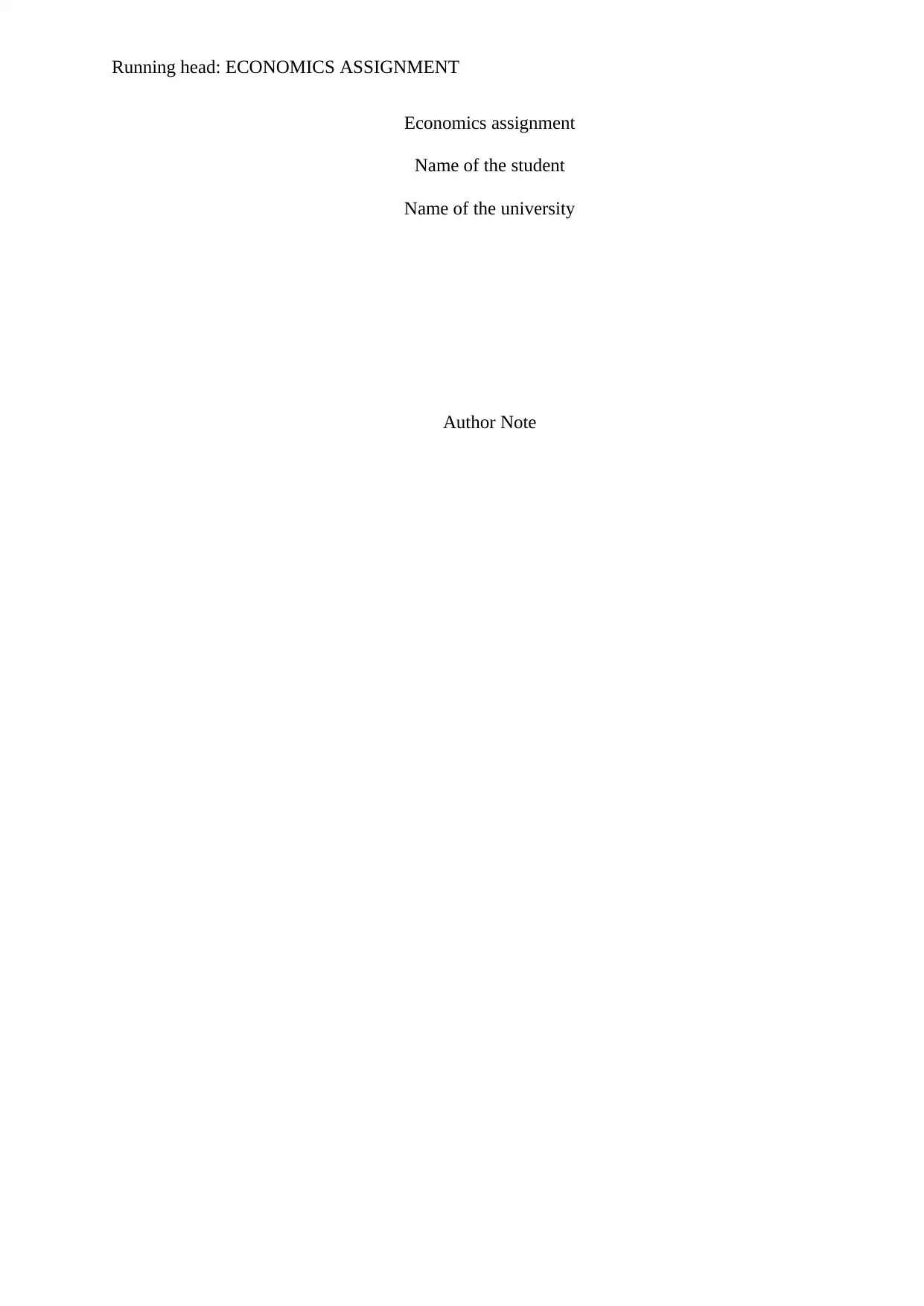
Running head: ECONOMICS ASSIGNMENT
Economics assignment
Name of the student
Name of the university
Author Note
Economics assignment
Name of the student
Name of the university
Author Note
Paraphrase This Document
Need a fresh take? Get an instant paraphrase of this document with our AI Paraphraser
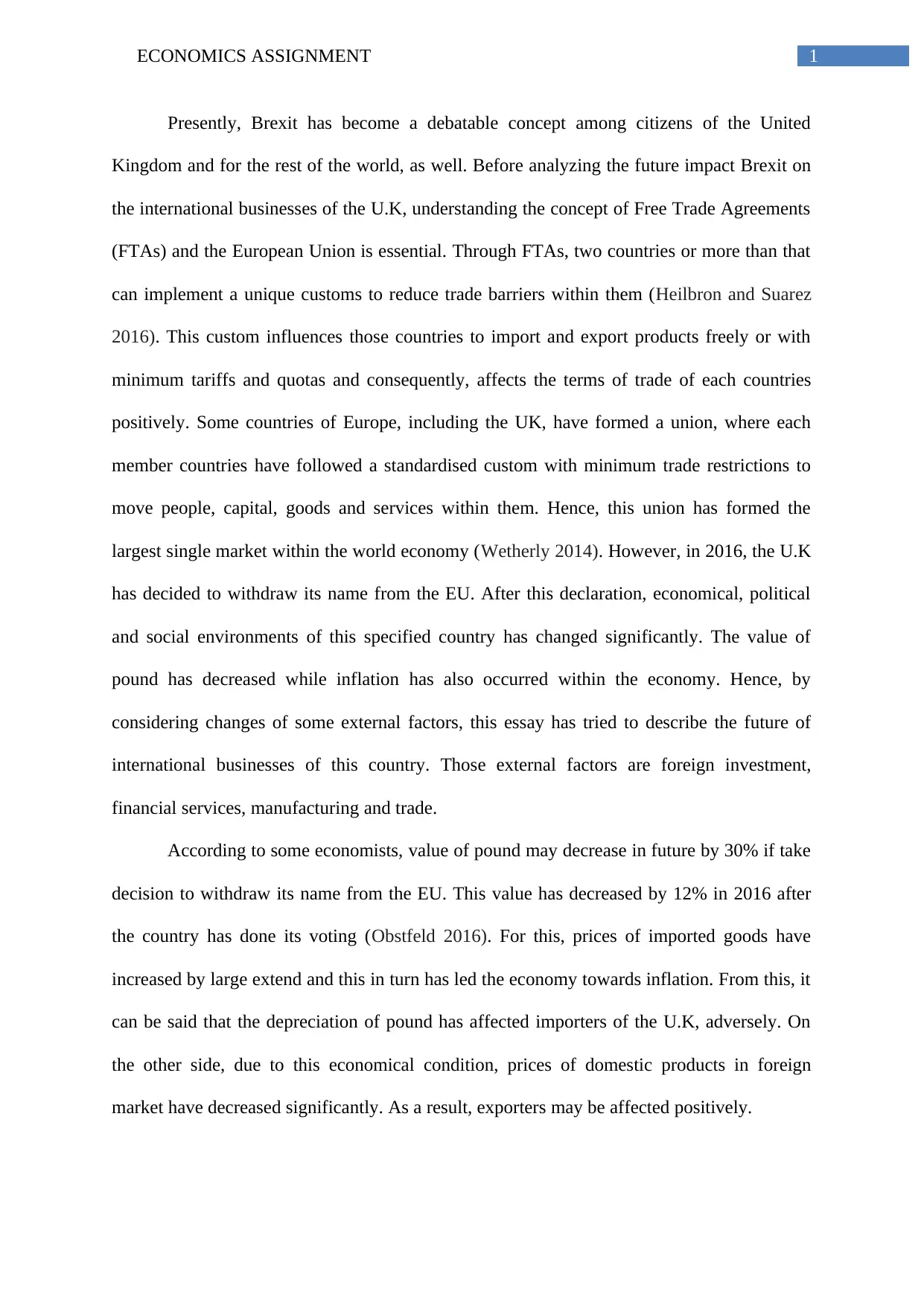
1ECONOMICS ASSIGNMENT
Presently, Brexit has become a debatable concept among citizens of the United
Kingdom and for the rest of the world, as well. Before analyzing the future impact Brexit on
the international businesses of the U.K, understanding the concept of Free Trade Agreements
(FTAs) and the European Union is essential. Through FTAs, two countries or more than that
can implement a unique customs to reduce trade barriers within them (Heilbron and Suarez
2016). This custom influences those countries to import and export products freely or with
minimum tariffs and quotas and consequently, affects the terms of trade of each countries
positively. Some countries of Europe, including the UK, have formed a union, where each
member countries have followed a standardised custom with minimum trade restrictions to
move people, capital, goods and services within them. Hence, this union has formed the
largest single market within the world economy (Wetherly 2014). However, in 2016, the U.K
has decided to withdraw its name from the EU. After this declaration, economical, political
and social environments of this specified country has changed significantly. The value of
pound has decreased while inflation has also occurred within the economy. Hence, by
considering changes of some external factors, this essay has tried to describe the future of
international businesses of this country. Those external factors are foreign investment,
financial services, manufacturing and trade.
According to some economists, value of pound may decrease in future by 30% if take
decision to withdraw its name from the EU. This value has decreased by 12% in 2016 after
the country has done its voting (Obstfeld 2016). For this, prices of imported goods have
increased by large extend and this in turn has led the economy towards inflation. From this, it
can be said that the depreciation of pound has affected importers of the U.K, adversely. On
the other side, due to this economical condition, prices of domestic products in foreign
market have decreased significantly. As a result, exporters may be affected positively.
Presently, Brexit has become a debatable concept among citizens of the United
Kingdom and for the rest of the world, as well. Before analyzing the future impact Brexit on
the international businesses of the U.K, understanding the concept of Free Trade Agreements
(FTAs) and the European Union is essential. Through FTAs, two countries or more than that
can implement a unique customs to reduce trade barriers within them (Heilbron and Suarez
2016). This custom influences those countries to import and export products freely or with
minimum tariffs and quotas and consequently, affects the terms of trade of each countries
positively. Some countries of Europe, including the UK, have formed a union, where each
member countries have followed a standardised custom with minimum trade restrictions to
move people, capital, goods and services within them. Hence, this union has formed the
largest single market within the world economy (Wetherly 2014). However, in 2016, the U.K
has decided to withdraw its name from the EU. After this declaration, economical, political
and social environments of this specified country has changed significantly. The value of
pound has decreased while inflation has also occurred within the economy. Hence, by
considering changes of some external factors, this essay has tried to describe the future of
international businesses of this country. Those external factors are foreign investment,
financial services, manufacturing and trade.
According to some economists, value of pound may decrease in future by 30% if take
decision to withdraw its name from the EU. This value has decreased by 12% in 2016 after
the country has done its voting (Obstfeld 2016). For this, prices of imported goods have
increased by large extend and this in turn has led the economy towards inflation. From this, it
can be said that the depreciation of pound has affected importers of the U.K, adversely. On
the other side, due to this economical condition, prices of domestic products in foreign
market have decreased significantly. As a result, exporters may be affected positively.
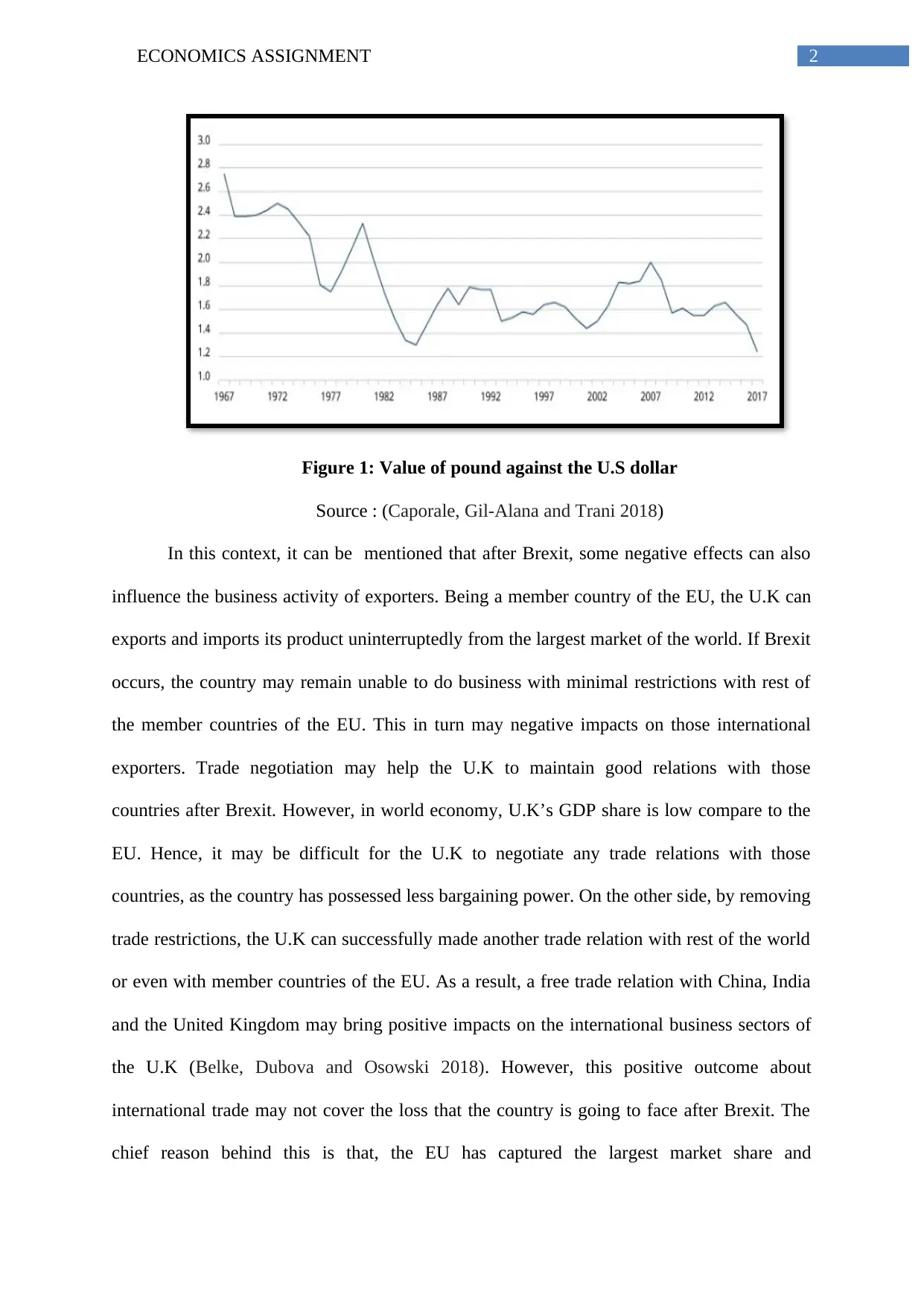
2ECONOMICS ASSIGNMENT
Figure 1: Value of pound against the U.S dollar
Source : (Caporale, Gil-Alana and Trani 2018)
In this context, it can be mentioned that after Brexit, some negative effects can also
influence the business activity of exporters. Being a member country of the EU, the U.K can
exports and imports its product uninterruptedly from the largest market of the world. If Brexit
occurs, the country may remain unable to do business with minimal restrictions with rest of
the member countries of the EU. This in turn may negative impacts on those international
exporters. Trade negotiation may help the U.K to maintain good relations with those
countries after Brexit. However, in world economy, U.K’s GDP share is low compare to the
EU. Hence, it may be difficult for the U.K to negotiate any trade relations with those
countries, as the country has possessed less bargaining power. On the other side, by removing
trade restrictions, the U.K can successfully made another trade relation with rest of the world
or even with member countries of the EU. As a result, a free trade relation with China, India
and the United Kingdom may bring positive impacts on the international business sectors of
the U.K (Belke, Dubova and Osowski 2018). However, this positive outcome about
international trade may not cover the loss that the country is going to face after Brexit. The
chief reason behind this is that, the EU has captured the largest market share and
Figure 1: Value of pound against the U.S dollar
Source : (Caporale, Gil-Alana and Trani 2018)
In this context, it can be mentioned that after Brexit, some negative effects can also
influence the business activity of exporters. Being a member country of the EU, the U.K can
exports and imports its product uninterruptedly from the largest market of the world. If Brexit
occurs, the country may remain unable to do business with minimal restrictions with rest of
the member countries of the EU. This in turn may negative impacts on those international
exporters. Trade negotiation may help the U.K to maintain good relations with those
countries after Brexit. However, in world economy, U.K’s GDP share is low compare to the
EU. Hence, it may be difficult for the U.K to negotiate any trade relations with those
countries, as the country has possessed less bargaining power. On the other side, by removing
trade restrictions, the U.K can successfully made another trade relation with rest of the world
or even with member countries of the EU. As a result, a free trade relation with China, India
and the United Kingdom may bring positive impacts on the international business sectors of
the U.K (Belke, Dubova and Osowski 2018). However, this positive outcome about
international trade may not cover the loss that the country is going to face after Brexit. The
chief reason behind this is that, the EU has captured the largest market share and
⊘ This is a preview!⊘
Do you want full access?
Subscribe today to unlock all pages.

Trusted by 1+ million students worldwide
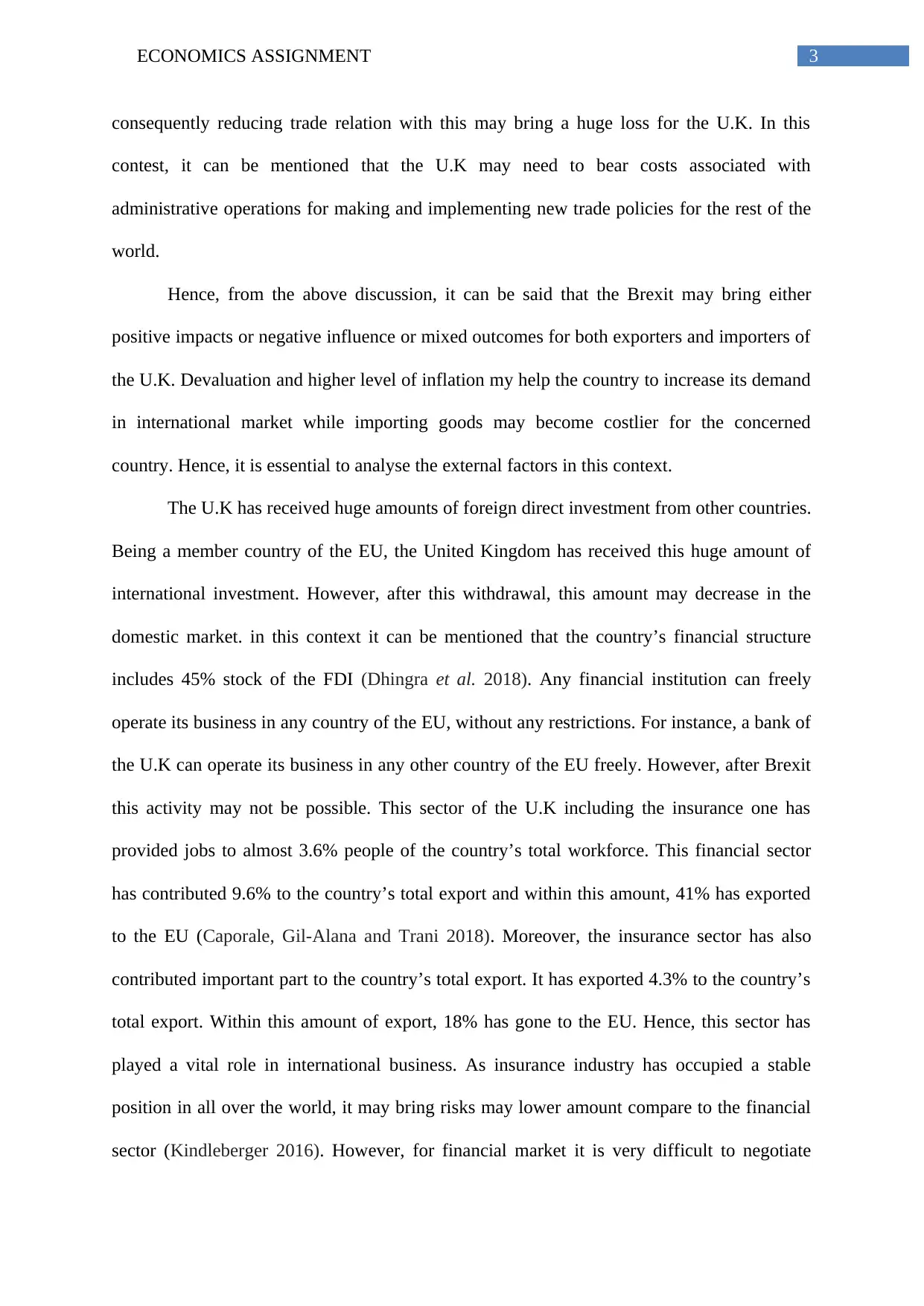
3ECONOMICS ASSIGNMENT
consequently reducing trade relation with this may bring a huge loss for the U.K. In this
contest, it can be mentioned that the U.K may need to bear costs associated with
administrative operations for making and implementing new trade policies for the rest of the
world.
Hence, from the above discussion, it can be said that the Brexit may bring either
positive impacts or negative influence or mixed outcomes for both exporters and importers of
the U.K. Devaluation and higher level of inflation my help the country to increase its demand
in international market while importing goods may become costlier for the concerned
country. Hence, it is essential to analyse the external factors in this context.
The U.K has received huge amounts of foreign direct investment from other countries.
Being a member country of the EU, the United Kingdom has received this huge amount of
international investment. However, after this withdrawal, this amount may decrease in the
domestic market. in this context it can be mentioned that the country’s financial structure
includes 45% stock of the FDI (Dhingra et al. 2018). Any financial institution can freely
operate its business in any country of the EU, without any restrictions. For instance, a bank of
the U.K can operate its business in any other country of the EU freely. However, after Brexit
this activity may not be possible. This sector of the U.K including the insurance one has
provided jobs to almost 3.6% people of the country’s total workforce. This financial sector
has contributed 9.6% to the country’s total export and within this amount, 41% has exported
to the EU (Caporale, Gil-Alana and Trani 2018). Moreover, the insurance sector has also
contributed important part to the country’s total export. It has exported 4.3% to the country’s
total export. Within this amount of export, 18% has gone to the EU. Hence, this sector has
played a vital role in international business. As insurance industry has occupied a stable
position in all over the world, it may bring risks may lower amount compare to the financial
sector (Kindleberger 2016). However, for financial market it is very difficult to negotiate
consequently reducing trade relation with this may bring a huge loss for the U.K. In this
contest, it can be mentioned that the U.K may need to bear costs associated with
administrative operations for making and implementing new trade policies for the rest of the
world.
Hence, from the above discussion, it can be said that the Brexit may bring either
positive impacts or negative influence or mixed outcomes for both exporters and importers of
the U.K. Devaluation and higher level of inflation my help the country to increase its demand
in international market while importing goods may become costlier for the concerned
country. Hence, it is essential to analyse the external factors in this context.
The U.K has received huge amounts of foreign direct investment from other countries.
Being a member country of the EU, the United Kingdom has received this huge amount of
international investment. However, after this withdrawal, this amount may decrease in the
domestic market. in this context it can be mentioned that the country’s financial structure
includes 45% stock of the FDI (Dhingra et al. 2018). Any financial institution can freely
operate its business in any country of the EU, without any restrictions. For instance, a bank of
the U.K can operate its business in any other country of the EU freely. However, after Brexit
this activity may not be possible. This sector of the U.K including the insurance one has
provided jobs to almost 3.6% people of the country’s total workforce. This financial sector
has contributed 9.6% to the country’s total export and within this amount, 41% has exported
to the EU (Caporale, Gil-Alana and Trani 2018). Moreover, the insurance sector has also
contributed important part to the country’s total export. It has exported 4.3% to the country’s
total export. Within this amount of export, 18% has gone to the EU. Hence, this sector has
played a vital role in international business. As insurance industry has occupied a stable
position in all over the world, it may bring risks may lower amount compare to the financial
sector (Kindleberger 2016). However, for financial market it is very difficult to negotiate
Paraphrase This Document
Need a fresh take? Get an instant paraphrase of this document with our AI Paraphraser
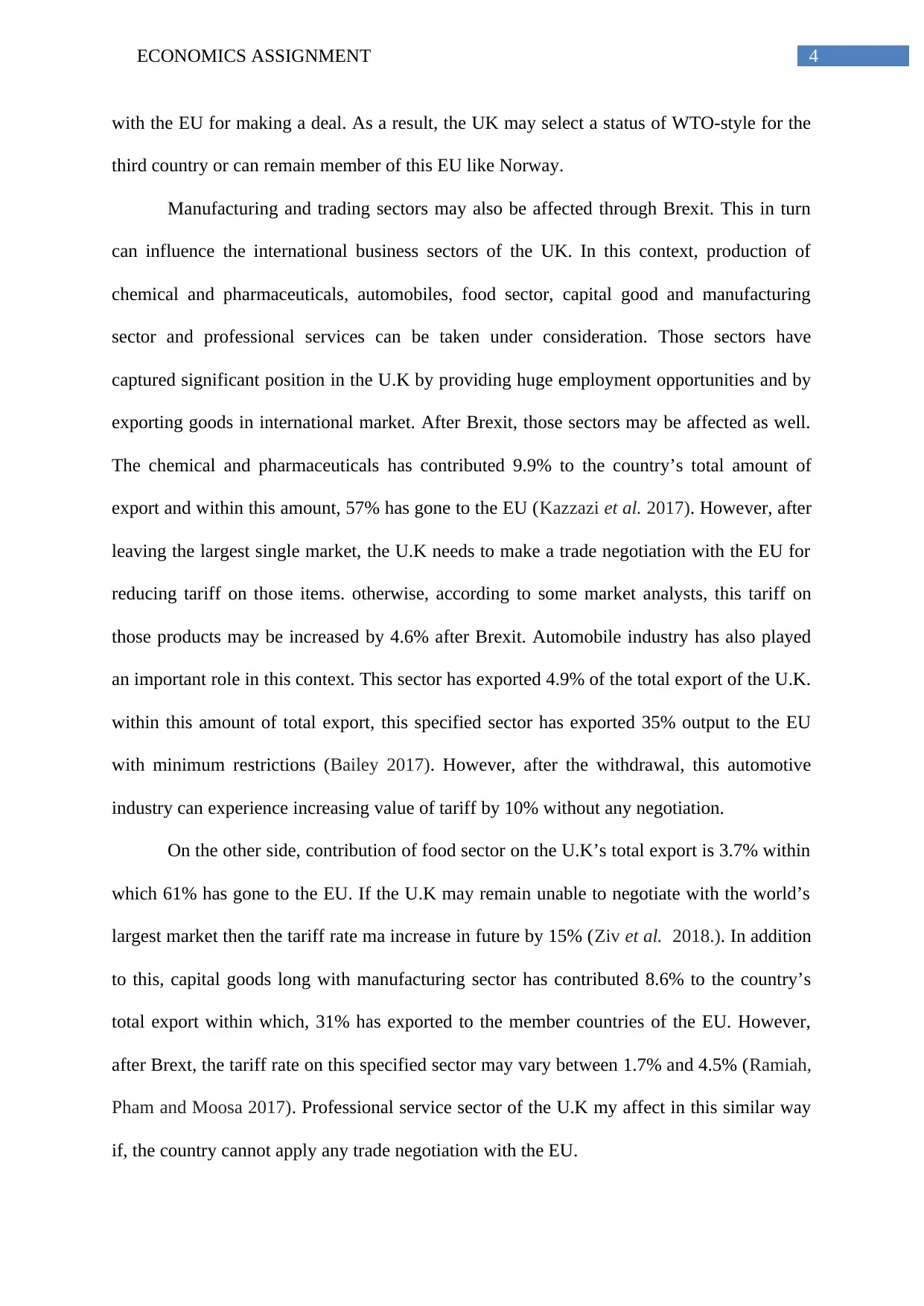
4ECONOMICS ASSIGNMENT
with the EU for making a deal. As a result, the UK may select a status of WTO-style for the
third country or can remain member of this EU like Norway.
Manufacturing and trading sectors may also be affected through Brexit. This in turn
can influence the international business sectors of the UK. In this context, production of
chemical and pharmaceuticals, automobiles, food sector, capital good and manufacturing
sector and professional services can be taken under consideration. Those sectors have
captured significant position in the U.K by providing huge employment opportunities and by
exporting goods in international market. After Brexit, those sectors may be affected as well.
The chemical and pharmaceuticals has contributed 9.9% to the country’s total amount of
export and within this amount, 57% has gone to the EU (Kazzazi et al. 2017). However, after
leaving the largest single market, the U.K needs to make a trade negotiation with the EU for
reducing tariff on those items. otherwise, according to some market analysts, this tariff on
those products may be increased by 4.6% after Brexit. Automobile industry has also played
an important role in this context. This sector has exported 4.9% of the total export of the U.K.
within this amount of total export, this specified sector has exported 35% output to the EU
with minimum restrictions (Bailey 2017). However, after the withdrawal, this automotive
industry can experience increasing value of tariff by 10% without any negotiation.
On the other side, contribution of food sector on the U.K’s total export is 3.7% within
which 61% has gone to the EU. If the U.K may remain unable to negotiate with the world’s
largest market then the tariff rate ma increase in future by 15% (Ziv et al. 2018.). In addition
to this, capital goods long with manufacturing sector has contributed 8.6% to the country’s
total export within which, 31% has exported to the member countries of the EU. However,
after Brext, the tariff rate on this specified sector may vary between 1.7% and 4.5% (Ramiah,
Pham and Moosa 2017). Professional service sector of the U.K my affect in this similar way
if, the country cannot apply any trade negotiation with the EU.
with the EU for making a deal. As a result, the UK may select a status of WTO-style for the
third country or can remain member of this EU like Norway.
Manufacturing and trading sectors may also be affected through Brexit. This in turn
can influence the international business sectors of the UK. In this context, production of
chemical and pharmaceuticals, automobiles, food sector, capital good and manufacturing
sector and professional services can be taken under consideration. Those sectors have
captured significant position in the U.K by providing huge employment opportunities and by
exporting goods in international market. After Brexit, those sectors may be affected as well.
The chemical and pharmaceuticals has contributed 9.9% to the country’s total amount of
export and within this amount, 57% has gone to the EU (Kazzazi et al. 2017). However, after
leaving the largest single market, the U.K needs to make a trade negotiation with the EU for
reducing tariff on those items. otherwise, according to some market analysts, this tariff on
those products may be increased by 4.6% after Brexit. Automobile industry has also played
an important role in this context. This sector has exported 4.9% of the total export of the U.K.
within this amount of total export, this specified sector has exported 35% output to the EU
with minimum restrictions (Bailey 2017). However, after the withdrawal, this automotive
industry can experience increasing value of tariff by 10% without any negotiation.
On the other side, contribution of food sector on the U.K’s total export is 3.7% within
which 61% has gone to the EU. If the U.K may remain unable to negotiate with the world’s
largest market then the tariff rate ma increase in future by 15% (Ziv et al. 2018.). In addition
to this, capital goods long with manufacturing sector has contributed 8.6% to the country’s
total export within which, 31% has exported to the member countries of the EU. However,
after Brext, the tariff rate on this specified sector may vary between 1.7% and 4.5% (Ramiah,
Pham and Moosa 2017). Professional service sector of the U.K my affect in this similar way
if, the country cannot apply any trade negotiation with the EU.
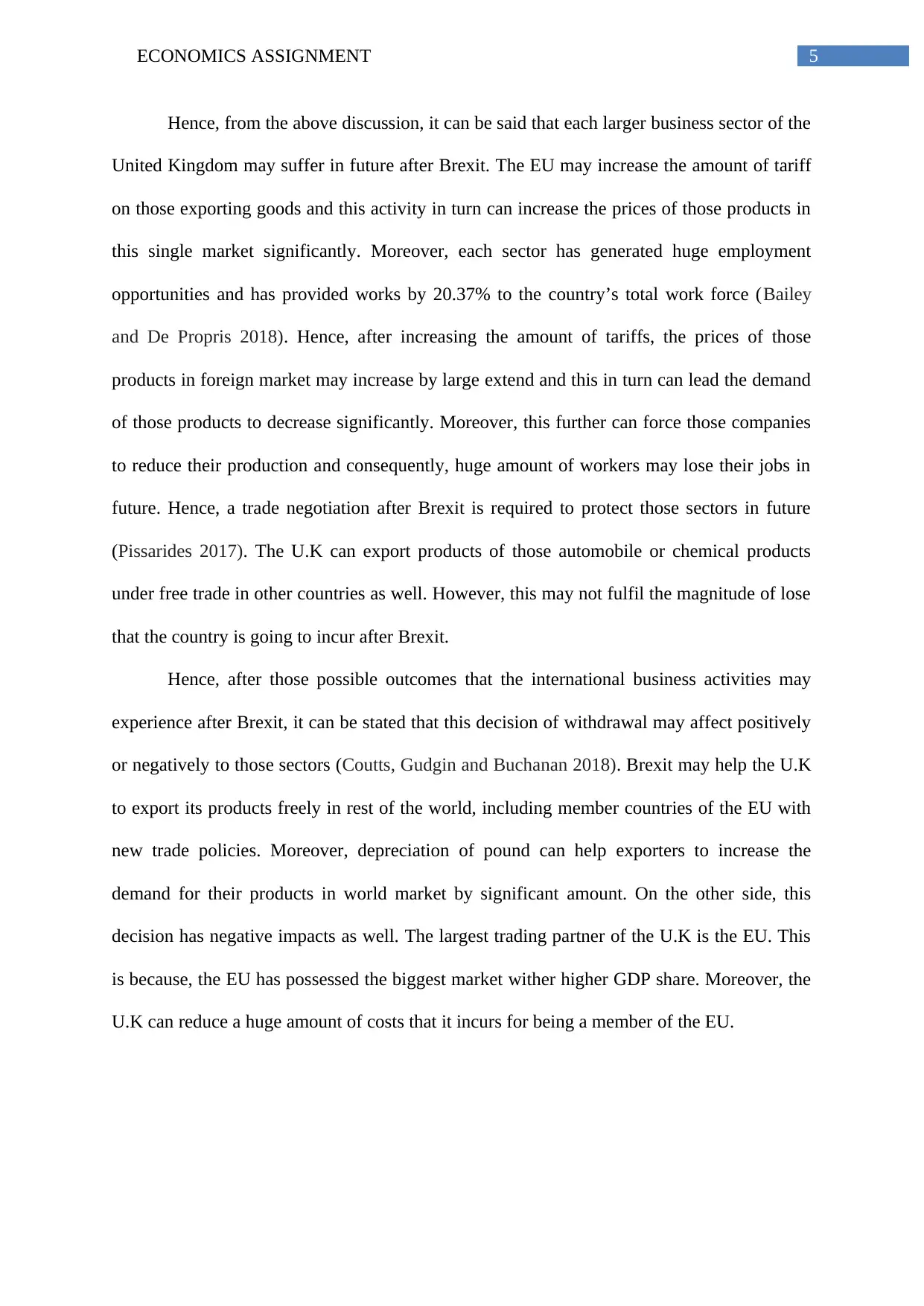
5ECONOMICS ASSIGNMENT
Hence, from the above discussion, it can be said that each larger business sector of the
United Kingdom may suffer in future after Brexit. The EU may increase the amount of tariff
on those exporting goods and this activity in turn can increase the prices of those products in
this single market significantly. Moreover, each sector has generated huge employment
opportunities and has provided works by 20.37% to the country’s total work force (Bailey
and De Propris 2018). Hence, after increasing the amount of tariffs, the prices of those
products in foreign market may increase by large extend and this in turn can lead the demand
of those products to decrease significantly. Moreover, this further can force those companies
to reduce their production and consequently, huge amount of workers may lose their jobs in
future. Hence, a trade negotiation after Brexit is required to protect those sectors in future
(Pissarides 2017). The U.K can export products of those automobile or chemical products
under free trade in other countries as well. However, this may not fulfil the magnitude of lose
that the country is going to incur after Brexit.
Hence, after those possible outcomes that the international business activities may
experience after Brexit, it can be stated that this decision of withdrawal may affect positively
or negatively to those sectors (Coutts, Gudgin and Buchanan 2018). Brexit may help the U.K
to export its products freely in rest of the world, including member countries of the EU with
new trade policies. Moreover, depreciation of pound can help exporters to increase the
demand for their products in world market by significant amount. On the other side, this
decision has negative impacts as well. The largest trading partner of the U.K is the EU. This
is because, the EU has possessed the biggest market wither higher GDP share. Moreover, the
U.K can reduce a huge amount of costs that it incurs for being a member of the EU.
Hence, from the above discussion, it can be said that each larger business sector of the
United Kingdom may suffer in future after Brexit. The EU may increase the amount of tariff
on those exporting goods and this activity in turn can increase the prices of those products in
this single market significantly. Moreover, each sector has generated huge employment
opportunities and has provided works by 20.37% to the country’s total work force (Bailey
and De Propris 2018). Hence, after increasing the amount of tariffs, the prices of those
products in foreign market may increase by large extend and this in turn can lead the demand
of those products to decrease significantly. Moreover, this further can force those companies
to reduce their production and consequently, huge amount of workers may lose their jobs in
future. Hence, a trade negotiation after Brexit is required to protect those sectors in future
(Pissarides 2017). The U.K can export products of those automobile or chemical products
under free trade in other countries as well. However, this may not fulfil the magnitude of lose
that the country is going to incur after Brexit.
Hence, after those possible outcomes that the international business activities may
experience after Brexit, it can be stated that this decision of withdrawal may affect positively
or negatively to those sectors (Coutts, Gudgin and Buchanan 2018). Brexit may help the U.K
to export its products freely in rest of the world, including member countries of the EU with
new trade policies. Moreover, depreciation of pound can help exporters to increase the
demand for their products in world market by significant amount. On the other side, this
decision has negative impacts as well. The largest trading partner of the U.K is the EU. This
is because, the EU has possessed the biggest market wither higher GDP share. Moreover, the
U.K can reduce a huge amount of costs that it incurs for being a member of the EU.
⊘ This is a preview!⊘
Do you want full access?
Subscribe today to unlock all pages.

Trusted by 1+ million students worldwide
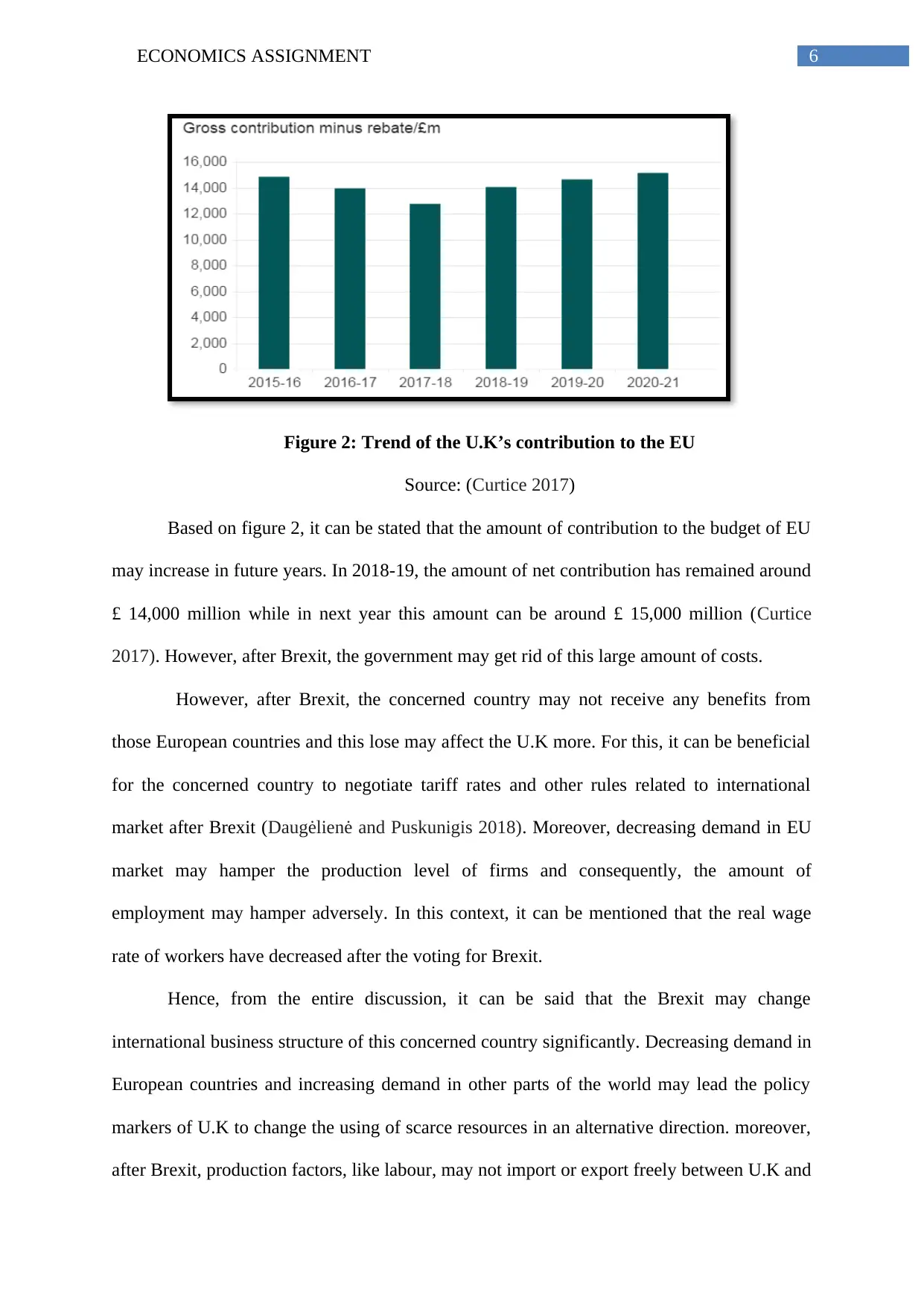
6ECONOMICS ASSIGNMENT
Figure 2: Trend of the U.K’s contribution to the EU
Source: (Curtice 2017)
Based on figure 2, it can be stated that the amount of contribution to the budget of EU
may increase in future years. In 2018-19, the amount of net contribution has remained around
£ 14,000 million while in next year this amount can be around £ 15,000 million (Curtice
2017). However, after Brexit, the government may get rid of this large amount of costs.
However, after Brexit, the concerned country may not receive any benefits from
those European countries and this lose may affect the U.K more. For this, it can be beneficial
for the concerned country to negotiate tariff rates and other rules related to international
market after Brexit (Daugėlienė and Puskunigis 2018). Moreover, decreasing demand in EU
market may hamper the production level of firms and consequently, the amount of
employment may hamper adversely. In this context, it can be mentioned that the real wage
rate of workers have decreased after the voting for Brexit.
Hence, from the entire discussion, it can be said that the Brexit may change
international business structure of this concerned country significantly. Decreasing demand in
European countries and increasing demand in other parts of the world may lead the policy
markers of U.K to change the using of scarce resources in an alternative direction. moreover,
after Brexit, production factors, like labour, may not import or export freely between U.K and
Figure 2: Trend of the U.K’s contribution to the EU
Source: (Curtice 2017)
Based on figure 2, it can be stated that the amount of contribution to the budget of EU
may increase in future years. In 2018-19, the amount of net contribution has remained around
£ 14,000 million while in next year this amount can be around £ 15,000 million (Curtice
2017). However, after Brexit, the government may get rid of this large amount of costs.
However, after Brexit, the concerned country may not receive any benefits from
those European countries and this lose may affect the U.K more. For this, it can be beneficial
for the concerned country to negotiate tariff rates and other rules related to international
market after Brexit (Daugėlienė and Puskunigis 2018). Moreover, decreasing demand in EU
market may hamper the production level of firms and consequently, the amount of
employment may hamper adversely. In this context, it can be mentioned that the real wage
rate of workers have decreased after the voting for Brexit.
Hence, from the entire discussion, it can be said that the Brexit may change
international business structure of this concerned country significantly. Decreasing demand in
European countries and increasing demand in other parts of the world may lead the policy
markers of U.K to change the using of scarce resources in an alternative direction. moreover,
after Brexit, production factors, like labour, may not import or export freely between U.K and
Paraphrase This Document
Need a fresh take? Get an instant paraphrase of this document with our AI Paraphraser
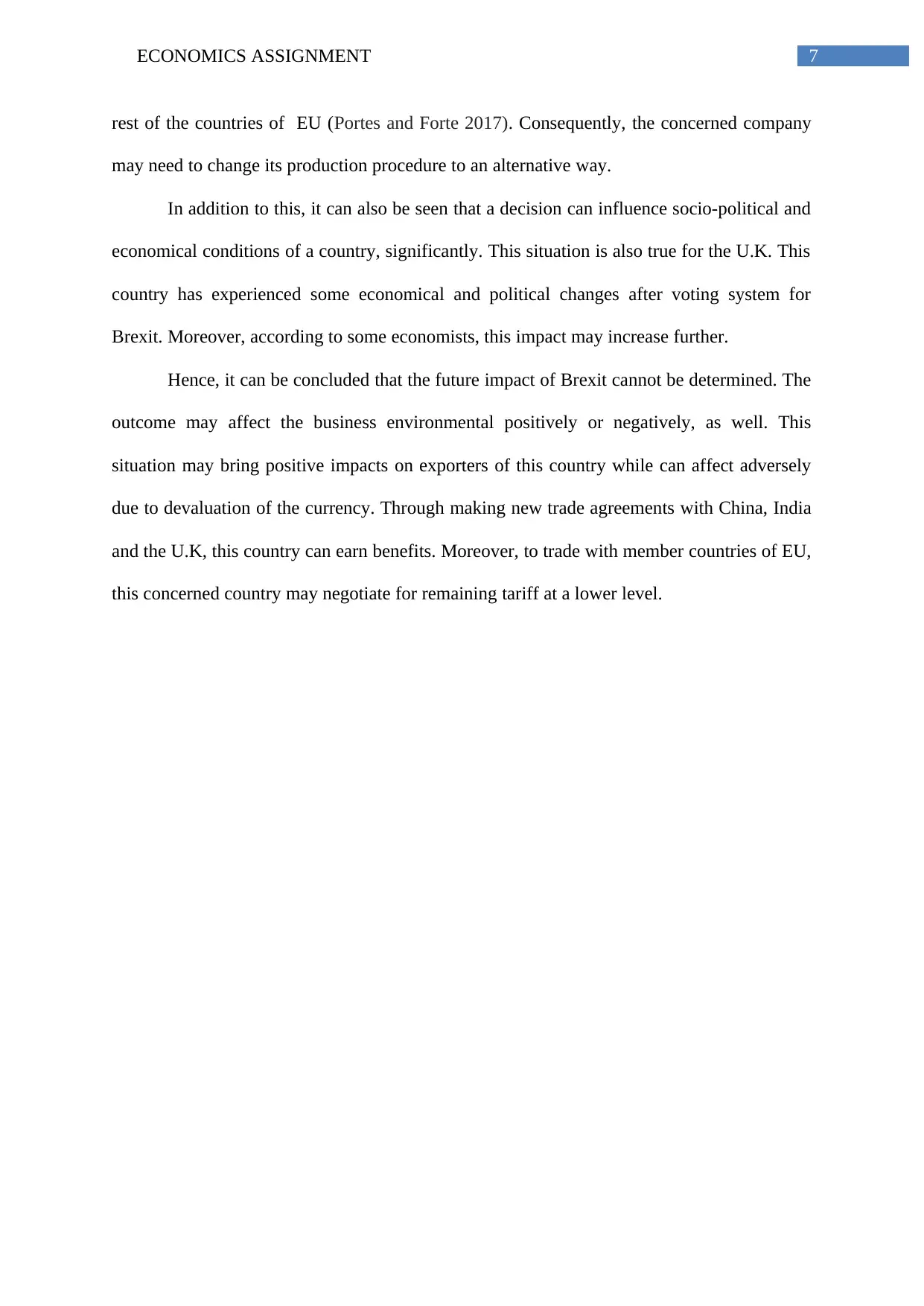
7ECONOMICS ASSIGNMENT
rest of the countries of EU (Portes and Forte 2017). Consequently, the concerned company
may need to change its production procedure to an alternative way.
In addition to this, it can also be seen that a decision can influence socio-political and
economical conditions of a country, significantly. This situation is also true for the U.K. This
country has experienced some economical and political changes after voting system for
Brexit. Moreover, according to some economists, this impact may increase further.
Hence, it can be concluded that the future impact of Brexit cannot be determined. The
outcome may affect the business environmental positively or negatively, as well. This
situation may bring positive impacts on exporters of this country while can affect adversely
due to devaluation of the currency. Through making new trade agreements with China, India
and the U.K, this country can earn benefits. Moreover, to trade with member countries of EU,
this concerned country may negotiate for remaining tariff at a lower level.
rest of the countries of EU (Portes and Forte 2017). Consequently, the concerned company
may need to change its production procedure to an alternative way.
In addition to this, it can also be seen that a decision can influence socio-political and
economical conditions of a country, significantly. This situation is also true for the U.K. This
country has experienced some economical and political changes after voting system for
Brexit. Moreover, according to some economists, this impact may increase further.
Hence, it can be concluded that the future impact of Brexit cannot be determined. The
outcome may affect the business environmental positively or negatively, as well. This
situation may bring positive impacts on exporters of this country while can affect adversely
due to devaluation of the currency. Through making new trade agreements with China, India
and the U.K, this country can earn benefits. Moreover, to trade with member countries of EU,
this concerned country may negotiate for remaining tariff at a lower level.
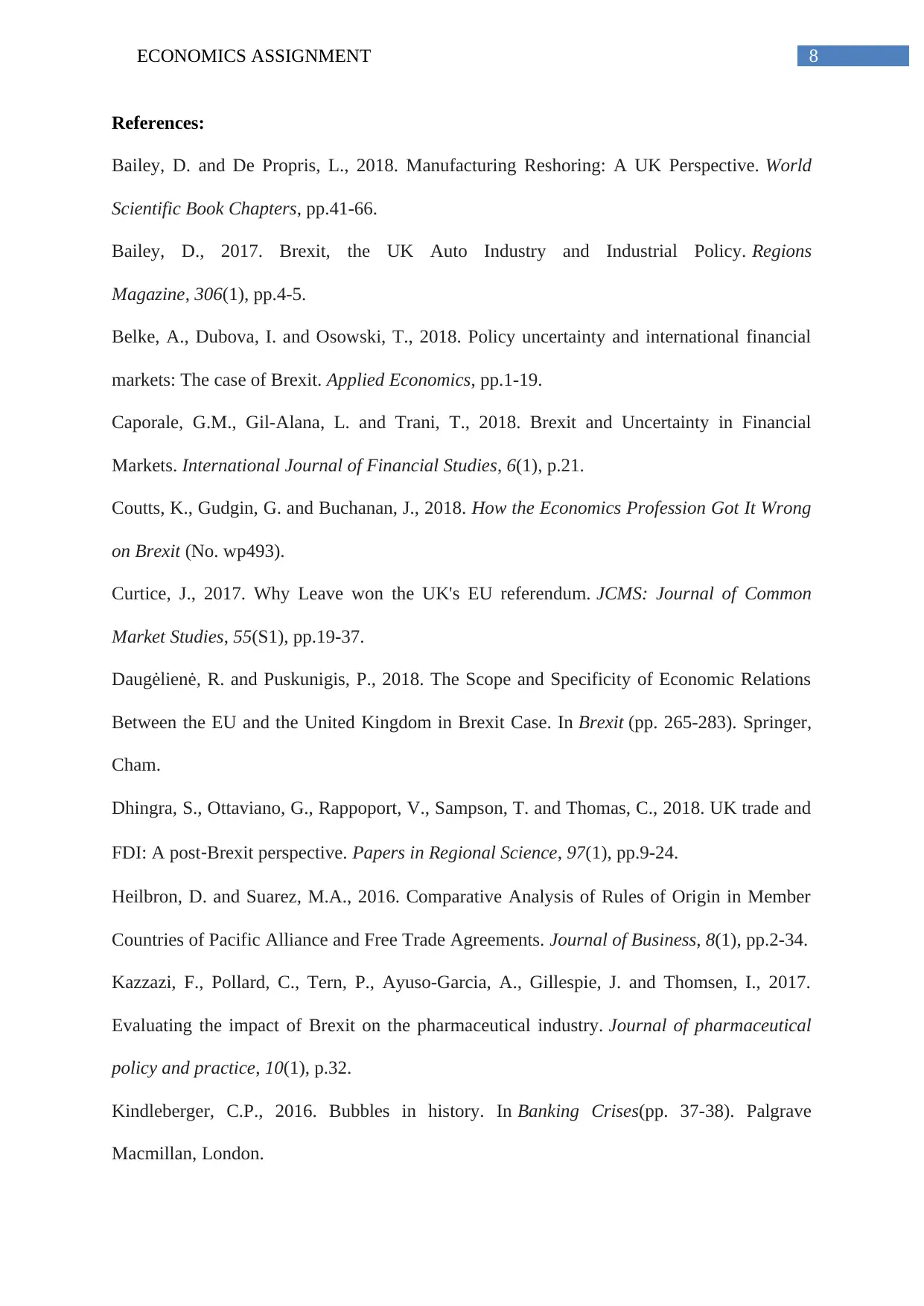
8ECONOMICS ASSIGNMENT
References:
Bailey, D. and De Propris, L., 2018. Manufacturing Reshoring: A UK Perspective. World
Scientific Book Chapters, pp.41-66.
Bailey, D., 2017. Brexit, the UK Auto Industry and Industrial Policy. Regions
Magazine, 306(1), pp.4-5.
Belke, A., Dubova, I. and Osowski, T., 2018. Policy uncertainty and international financial
markets: The case of Brexit. Applied Economics, pp.1-19.
Caporale, G.M., Gil-Alana, L. and Trani, T., 2018. Brexit and Uncertainty in Financial
Markets. International Journal of Financial Studies, 6(1), p.21.
Coutts, K., Gudgin, G. and Buchanan, J., 2018. How the Economics Profession Got It Wrong
on Brexit (No. wp493).
Curtice, J., 2017. Why Leave won the UK's EU referendum. JCMS: Journal of Common
Market Studies, 55(S1), pp.19-37.
Daugėlienė, R. and Puskunigis, P., 2018. The Scope and Specificity of Economic Relations
Between the EU and the United Kingdom in Brexit Case. In Brexit (pp. 265-283). Springer,
Cham.
Dhingra, S., Ottaviano, G., Rappoport, V., Sampson, T. and Thomas, C., 2018. UK trade and
FDI: A post‐Brexit perspective. Papers in Regional Science, 97(1), pp.9-24.
Heilbron, D. and Suarez, M.A., 2016. Comparative Analysis of Rules of Origin in Member
Countries of Pacific Alliance and Free Trade Agreements. Journal of Business, 8(1), pp.2-34.
Kazzazi, F., Pollard, C., Tern, P., Ayuso-Garcia, A., Gillespie, J. and Thomsen, I., 2017.
Evaluating the impact of Brexit on the pharmaceutical industry. Journal of pharmaceutical
policy and practice, 10(1), p.32.
Kindleberger, C.P., 2016. Bubbles in history. In Banking Crises(pp. 37-38). Palgrave
Macmillan, London.
References:
Bailey, D. and De Propris, L., 2018. Manufacturing Reshoring: A UK Perspective. World
Scientific Book Chapters, pp.41-66.
Bailey, D., 2017. Brexit, the UK Auto Industry and Industrial Policy. Regions
Magazine, 306(1), pp.4-5.
Belke, A., Dubova, I. and Osowski, T., 2018. Policy uncertainty and international financial
markets: The case of Brexit. Applied Economics, pp.1-19.
Caporale, G.M., Gil-Alana, L. and Trani, T., 2018. Brexit and Uncertainty in Financial
Markets. International Journal of Financial Studies, 6(1), p.21.
Coutts, K., Gudgin, G. and Buchanan, J., 2018. How the Economics Profession Got It Wrong
on Brexit (No. wp493).
Curtice, J., 2017. Why Leave won the UK's EU referendum. JCMS: Journal of Common
Market Studies, 55(S1), pp.19-37.
Daugėlienė, R. and Puskunigis, P., 2018. The Scope and Specificity of Economic Relations
Between the EU and the United Kingdom in Brexit Case. In Brexit (pp. 265-283). Springer,
Cham.
Dhingra, S., Ottaviano, G., Rappoport, V., Sampson, T. and Thomas, C., 2018. UK trade and
FDI: A post‐Brexit perspective. Papers in Regional Science, 97(1), pp.9-24.
Heilbron, D. and Suarez, M.A., 2016. Comparative Analysis of Rules of Origin in Member
Countries of Pacific Alliance and Free Trade Agreements. Journal of Business, 8(1), pp.2-34.
Kazzazi, F., Pollard, C., Tern, P., Ayuso-Garcia, A., Gillespie, J. and Thomsen, I., 2017.
Evaluating the impact of Brexit on the pharmaceutical industry. Journal of pharmaceutical
policy and practice, 10(1), p.32.
Kindleberger, C.P., 2016. Bubbles in history. In Banking Crises(pp. 37-38). Palgrave
Macmillan, London.
⊘ This is a preview!⊘
Do you want full access?
Subscribe today to unlock all pages.

Trusted by 1+ million students worldwide
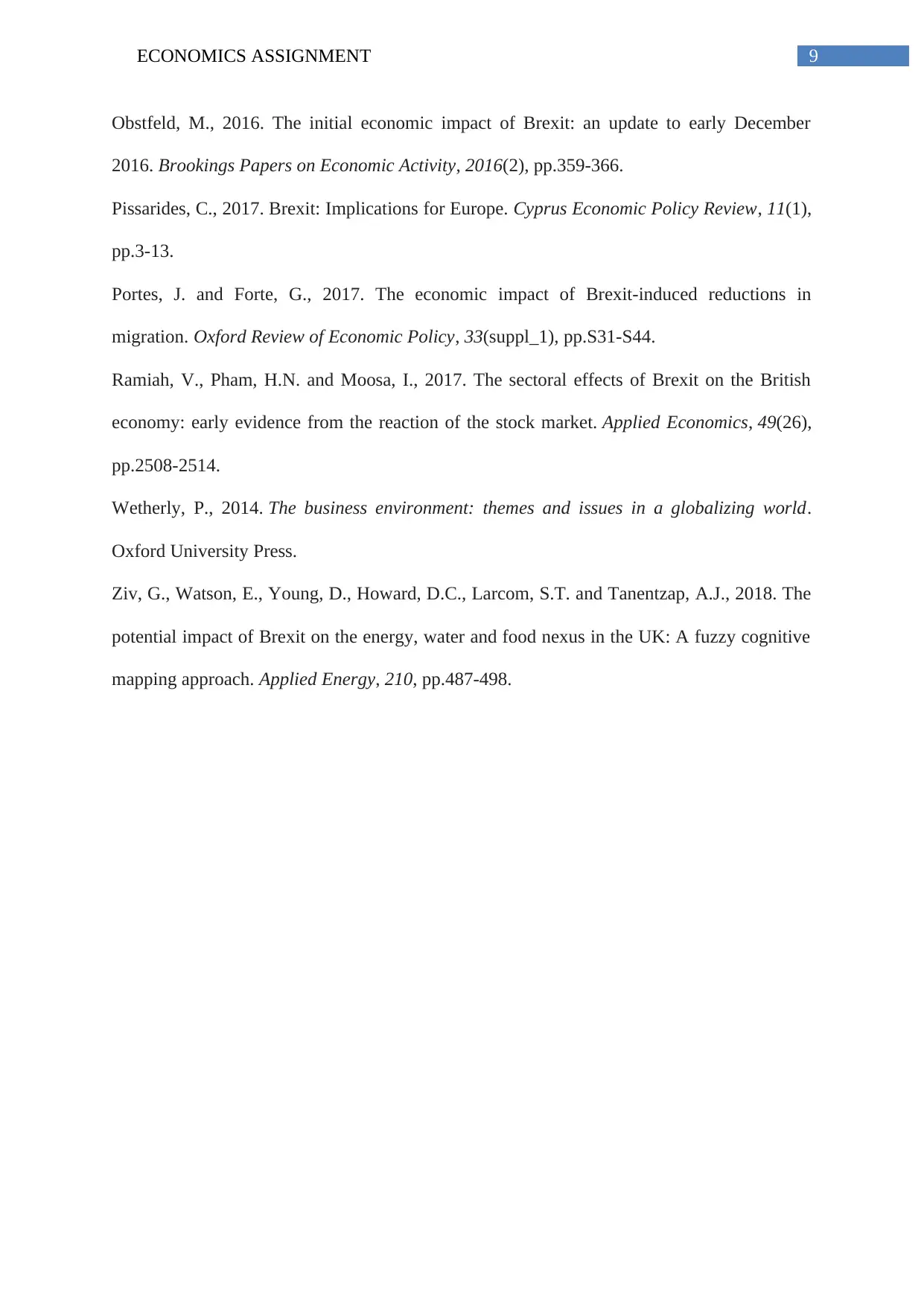
9ECONOMICS ASSIGNMENT
Obstfeld, M., 2016. The initial economic impact of Brexit: an update to early December
2016. Brookings Papers on Economic Activity, 2016(2), pp.359-366.
Pissarides, C., 2017. Brexit: Implications for Europe. Cyprus Economic Policy Review, 11(1),
pp.3-13.
Portes, J. and Forte, G., 2017. The economic impact of Brexit-induced reductions in
migration. Oxford Review of Economic Policy, 33(suppl_1), pp.S31-S44.
Ramiah, V., Pham, H.N. and Moosa, I., 2017. The sectoral effects of Brexit on the British
economy: early evidence from the reaction of the stock market. Applied Economics, 49(26),
pp.2508-2514.
Wetherly, P., 2014. The business environment: themes and issues in a globalizing world.
Oxford University Press.
Ziv, G., Watson, E., Young, D., Howard, D.C., Larcom, S.T. and Tanentzap, A.J., 2018. The
potential impact of Brexit on the energy, water and food nexus in the UK: A fuzzy cognitive
mapping approach. Applied Energy, 210, pp.487-498.
Obstfeld, M., 2016. The initial economic impact of Brexit: an update to early December
2016. Brookings Papers on Economic Activity, 2016(2), pp.359-366.
Pissarides, C., 2017. Brexit: Implications for Europe. Cyprus Economic Policy Review, 11(1),
pp.3-13.
Portes, J. and Forte, G., 2017. The economic impact of Brexit-induced reductions in
migration. Oxford Review of Economic Policy, 33(suppl_1), pp.S31-S44.
Ramiah, V., Pham, H.N. and Moosa, I., 2017. The sectoral effects of Brexit on the British
economy: early evidence from the reaction of the stock market. Applied Economics, 49(26),
pp.2508-2514.
Wetherly, P., 2014. The business environment: themes and issues in a globalizing world.
Oxford University Press.
Ziv, G., Watson, E., Young, D., Howard, D.C., Larcom, S.T. and Tanentzap, A.J., 2018. The
potential impact of Brexit on the energy, water and food nexus in the UK: A fuzzy cognitive
mapping approach. Applied Energy, 210, pp.487-498.
1 out of 10
Related Documents
Your All-in-One AI-Powered Toolkit for Academic Success.
+13062052269
info@desklib.com
Available 24*7 on WhatsApp / Email
![[object Object]](/_next/static/media/star-bottom.7253800d.svg)
Unlock your academic potential
Copyright © 2020–2025 A2Z Services. All Rights Reserved. Developed and managed by ZUCOL.




